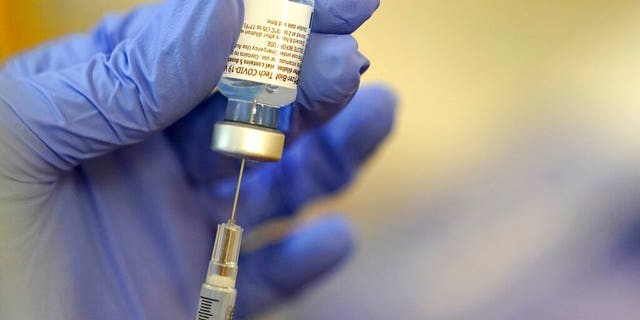FDA close to booster authorization for kids 12-15: report

Fox News Flash top headlines for January 1
Fox News Flash top headlines are here. Check out what’s clicking on Foxnews.com.
The U.S. Food and Drug Administration (FDA) is reportedly planning to expand eligibility for COVID-19 vaccine booster shots on Monday.
The agency will allow 12- to 15-year-olds to receive third doses of Pfizer-BioNTech’s vaccine, according to The New York Times.
The Times, which cited “people familiar with the agency’s deliberations,” also said that regulators are expected to authorize an extra shot of Pfizer’s vaccine for both adolescents and adults five months after receiving a second dose – shortened from the current interval of six months – and that children with immune deficiencies ages 5-11 would also be able to receive boosters.
The outlet reported that the decision was partially based on data from Israel that showed no serious safety concerns in the 12-15 age group, including myocarditis.
About 68.8 million Americans have received a booster shot, according to data from the U.S. Centers for Disease Control and Prevention (CDC).

A pharmacist prepares a syringe of the Pfizer-BioNTech COVID-19 vaccine Friday, Jan. 8, 2021, at Queen Anne Healthcare, a skilled nursing and rehabilitation facility in Seattle. Pfizer has committed to supply up to 40 million doses of its COVID-19 vaccine this year to a World Health Organization-backed effort to get affordable vaccines to 92 poor and middle-income countries. The deal announced Friday, Jan. 22 will supply the shots to the program known as COVAX.
( AP Photo/Ted S. Warren)
In December, the FDA amended the emergency use authorization for the Pfizer vaccine, authorizing the use of a booster dose for administration to individuals 16 and 17 years of age at least six months after completion of primary vaccination with the Pfizer vaccine.
“Vaccination and getting a booster when eligible, along with other preventive measures like masking and avoiding large crowds and poorly ventilated spaces, remain our most effective methods for fighting COVID-19,” acting FDA Commissioner Dr. Janet Woodcock said in a statement. “As people gather indoors with family and friends for the holidays, we can’t let up on all the preventive public health measures that we have been taking during the pandemic. With both the delta and omicron variants continuing to spread, vaccination remains the best protection against COVID-19.”
As the omicron variant has spread around the country, breaking daily case records, top public health leaders and the Biden administration have called on Americans to receive a booster shot.
According to research presented by White House chief medical adviser Dr. Anthony Fauci, people who receive a booster are given an extra level of protection against omicron as vaccine protection against infection wanes over time.
On Thursday, Israel approved a fourth dose of vaccine for people with weakened immune systems.
However, much remains unknown about the omicron strain and scientists are still working to learn about the variant’s transmissibility, severity and ability to evade vaccines and immune response.
The World Health Organization (WHO) and top officials have cautioned that it’s too early to be reassured by initial data suggesting that omicron leads to milder disease.

More than 70% of people aged 12 and older in the U.S. are fully vaccinated. Children under the age of 5 remain ineligible.
The Pfizer vaccine is one of the three federally authorized shots approved for emergency use in people under 18.
Pfizer CEO Albert Bourla told NBC’s “Today” show last month that the company’s booster would be enough to “maintain protection” against omicron.
“There is tremendous value compared to if you have only one or if you don’t have any. Tremendous value. It might not be enough on itself, but we are waiting to see,” he said. “So, you may need to go to get the third booster faster and that’s something that they have … considered very carefully and make their recommendations. But, clearly, having two doses compared to nothing protects you way better than having nothing.”
Source: Read Full Article
